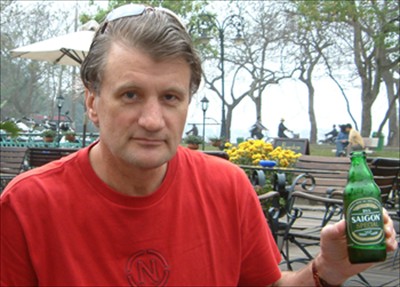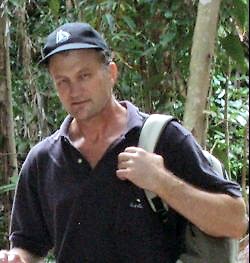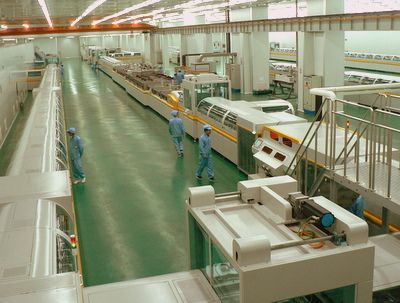
Note: Over the last 11 years, Robert Stone's portfolio gained 29.6% compounded a year. That means every $100,000 has grown to $1.73 million.
Aside from the small army of retirees who usually descend on annual general meetings (AGM), you can sometimes run into the occasional high net-worth investor who is not only younger but also very knowledgeable about the company's business.
At a recent AGM, I met one such investor: 51-year-old Robert Stone, a full-time investor with substantial investments in stocks listed on bourses ranging from Vietnam to Hong Kong to Indonesia and, of course, Singapore.
He also has an interesting career history, at least in this part of the world.
“I started working as a roughneck in the oilfields of Western Canada in 1978,” he began. An oilfield roughneck is a manual worker on the drill floor of oil rigs. At that time, he was taking a break from his university studies in New Zealand.
“It was the midst of the oil boom in the late 1970’s and although the work was hard physically and dangerous with long hours, I loved it.”
He eventually finished his degree in economics but stayed on in the oil industry. In 1980, the oilfield shut down in Canada due to a change in government policy. The business was still booming everywhere else and he decided Southeast Asia had the best prospects.
Canada-born Mr Stone has lived in Singapore for nearly 30 years, and is now a permanent resident and married to a Singaporean. The couple have three daughters aged seven, nine and 13.
Over the years, with the money he saved, he invested in stocks ranging from high-tech (such as Singapore-listed Anwell Technologies, which is emerging as one of China’s largest manufacturers of solar panels) to conservative (such as Merck KGaA, a global pharmaceutical company).
Revealing a salient feature of his investing approach, Mr Stone said: “In my own personal life, I have zero debt and don’t buy on margin. I like companies that are similarly conservative. One of the reasons that Merck has survived for 341 years is the Germans running it are extremely conservative. It is the best example of a company that I want to own.”
He expends far more than the usual effort put in by individual investors to check out companies he wants to put money into.
“Generally I won’t make more than a small initial investment in a company without meeting the management and usually visiting the facilities of the company. If for any reason the management makes me feel that they are not trustworthy or unconcerned for the interests of minority shareholders, that will terminate any interest I had in that company,” he said. “When I haven’t done this, I’ve usually lived to regret it.”

Could you tell us more about your career background?
A downturn hit the oil industry worldwide in 1982 and for the next 23 years that I remained in the industry it was tough going. I was fortunate as I always remained employed despite the oil exploration business losing about 85% of its workforce from the early 1980’s to the late 1990’s. For ten years, from 1995 I worked as a consultant Drilling Supervisor on offshore rigs which paid very well and gave me a lot of time off to pursue my own interests.
How did you become a full-time investor?
I’ve been investing in shares since I was about 17 years old. By the year 2000, the income from my investments was exceeding my income from working as a consultant. I had a great deal of flexibility in the amount of time I worked as a consultant so from 2000 to 2005, I progressively increased the time I spent on my investments until it became a full time job.
What are the companies you have invested in?
Twenty years ago, it seemed obvious that Asia would continue to grow and as these societies became wealthier and older the proportion of income spent on health care would rise dramatically. In the early 1990’s I invested in the listed local entities of four foreign controlled pharmaceutical companies in Indonesia.
These companies when they entered Indonesia were required to list and sell some shares. I figured that I could be more confident investing in foreign-run companies and that proved to be a good strategy. Two of these companies Pfizer and Bayer privatized turned out to be a windfall due to the Jakarta Stock Exchange rules that protect the interests of minority shareholders.
Pfizer was particularly generous. It offered nearly 10 times the last traded price to minority shareholders to ensure there would not be any objections. I’m still holding the other two - PT Merck, a subsidiary of Merck KGaA founded in 1668, the oldest pharmaceutical company in the world, and Schering Plough. My other long term holding in Indonesia is Delta Djakarta which is controlled by San Miguel and is one of only three licensed beer manufacturers there.
I am the only foreign individual shareholder of that company and own about 1 per cent of the listed shares.
Any stakes in companies listed in other stock exchanges?
In Sri Lanka I am holding just one company now - Chevron Sri Lanka which I own 2 per cent of.In Thailand, I own 3 ½ per cent of Aikchol, one of the listed hospital operators and a smaller shareholding in Furukawa, a Japanese controlled copper tube manufacturer.In Vietnam I sold most of the shares I’d accumulated since 2003 in 2007 but I’m still holding 9 per cent of Hacisco and a smaller shareholding in Hau Giang United Pharmaceutical, the largest domestic pharmaceutical manufacturer which are both listed on the HCMC Exchange.
I have some fond feelings for Hau Giang United. In December 2004 I bought 2 per cent of the shares on the OTC market several years before it listed. I expected to hold it for many years but by November of 2007 the valuation was so outrageous that I had to sell it, making some 30 times my original investment. The share price dropped about 75 per cent after I got out, so I bought back a much smaller holding last year.
And in Singapore?
Here I have just shy of 8 per cent of Singapore Windsor, between 2 ½ and 3 per cent of Sunmart, Darco Water, Dutech and about 1 per cent of three or four other companies, a couple of which I wish didn't have my name on the list of shareholders (Suneast and Reyphon). Most of these I bought within the last year.
Prior to last year, you weren’t invested in Singapore-listed stocks?
In recent years and prior to last year, the only company I owned a significant number of shares was Singapore Windsor. I started buying into that after visiting the factory in Shenzhen in December 2006. I was impressed by the two brothers who run the company, the way they ran their business and their long term record of profitability in an industry that I normally would not consider investing in.
In 2007 I thought markets everywhere were over valued so I was mostly selling, especially in Vietnam. At the start of 2008, I had about 30% of my assets in cash. I started buying into mostly S-chips, which is where I saw the best value, from the time of the first big market swoon in January 2008. Since then I’ve been buying continuously at a steady pace.
To my way of thinking, the market values of some of these companies are so ridiculously low that whichever companies survive will ultimately turn out to have been very good investments. In retrospect, I started buying too early. I bought into two companies, Suneast and Reyphon, which are now among the walking wounded.

You and I first met at the Anwell Technologies AGM a couple of weeks ago. I was there to interview the CEO. How did you come to own 3.2 m shares of the company, as stated in the company’s annual report?
I now have 4 million shares. I visited Anwell’s facilities in Dongguan and Anyang early last July and met chairman Franky Fan and the other prime movers behind the company. I guess I had the same tour of the Dongguan plant that Chinese Premier Wen got two weeks later and was similarly impressed.
But what really enthused me about the company was seeing the optical disc factory in Anyang. The efficiency of the process and the way the Anwell team has refined these machines to be the most productive in the world convinced me they would be able to achieve the same result in the thin film solar industry.

I believe this industry will develop much like the optical disc industry where only the most cost efficient manufacturers will survive in the longer term. I have followed the solar industry for 30 years and I now believe solar will soon be able to compete against traditional forms of energy without massive government subsidies. For Anwell I see the greatest potential in the replication equipment segment of the solar venture.
They have only three major competitors, all based in developed countries with less productive machines. I think Anwell will do the same thing they’ve done with the competition in the optical disc replication machinery business. As a result of that trip I was the first to pony up funds for the convertible notes deal last year although I felt then, when Anwell’s market cap was about $150 million, that the shares were a much better investment. Now the market cap is $45 million, and there is less uncertainty for the prospects of the solar venture in my opinion.
I understand you also own a chunk of Dawnrays Pharmaceuticals which is listed in Hong Kong. How did you come to own the stock?
I approached the management of Dawnrays in 2004 after buying a few million shares. The CFO at the time, Kehan Xu, who is now their strategic advisor, responded so positively that I was encouraged after visiting the plants in Suzhou to keep buying
I've been buying Dawnrays since 2004 and now own 4.25 per cent of the company. It's one company I feel most comfortable owning as I know and trust the management. Also I think the pharma industry in China has some long term trends in its favor and Dawnrays is one company that I think will benefit
You emailed me a picture of yourself in Hanoi and wrote about an unlisted company that you have an interest in. Can you elaborate on that investment?
The company is a subsidiary of Saigon Beer. It is based in Cantho in the Mekong Delta and supplies two types of beer on a fixed long-term contract to Saigon Beer. I bid for shares in the IPO of this company back in January 2005 and ended up with a bit more than 1 per cent of the shares. I’ve visited the factory twice since then but otherwise get almost no news of it.
Every year I receive dividends amounting to about a 10 per cent yield on my initial investment. They had plans to list but now the market has collapsed that has been put on hold. Whenever I’m in Vietnam I always have one of their brews in whatever restaurant I’m in. I was surprised to find their beer also selling in Hanoi which is why I got the picture taken.
Can you tell us more about your investing approach?
1. I like companies that are conservative. Merck is the best example of a company that I want to own. Despite Merck being conservatively run, I have been paid several times my original investment in dividends over the 18 years since I started buying it. It is also perfectly positioned for the future if Indonesia ever comes to realizing its economic potential. If all my other investments were to get wiped out but Merck survives, I’ll still be in good shape.
2. Being an individual has some advantages versus a fund manager who has to consider the liquidity of any counter as he may need to retain the option of selling out quickly. As liquidity is not an issue for me, (it took me 10 years to build my position in Merck) and being a long term investor, investing in small-cap companies is relatively attractive as the valuations tend to be very good and the growth prospects better than larger ones.
3. In theory, my main source of income is dividends not capital gains so I look for companies that have a track record of paying out good dividends. Both Merck and Chevron are companies that usually pay out all their earnings in dividends. It’s been my experience that companies with a serious commitment to pay dividends reliably are also the ones that tend to do better in the long term. They have to be more focused on costs if all capital expenditures are planned from what remains after the dividend is paid. This is one aspect I particularly like about Dawnrays which is making major capital expenditures to further its expansion plans without taking on debt but still paying out 40 per cent of its earnings in dividends.
4. I also think it’s important to invest in companies that have some significant barriers to entry. This is especially important in China as every investor is aware. This is one reason why I like the pharmaceutical business in China as not only does it have great growth prospects, the business is one of the few which regulation can benefit in the sense that it prevents the sudden entry of numerous competitors who will sell the same products at a lower price.
5. I like to feel that companies I’m a shareholder of are making a positive contribution to society in some way. For instance, with Anwell I think of that as being an ideological investment as much as a financial one. If they are successful in contributing to the process of driving down the dollar-per-watt cost of solar energy, they will have made a positive contribution in the process of reducing the emission of greenhouse gases. I believe this the biggest long term problem that the world faces.
Obviously these principles have not been applied in all the SGX companies I’ve invested in the last year or so. However, my thinking with these investments is they are somewhat speculative and opportunistic in nature. Only a few of them need to survive the current crisis and I think I’ll be well rewarded.
Some analysts reckon the stock market has bottomed and there are reasons to expect a sustained recovery. What do you think?
I more inclined to think we’re in the midst of a bear market rally. Until real estate prices stop falling in the US and elsewhere, there is going to be more bad news on banks needing capital to survive. I’m not impressed with the way that the new administration in the US has handled the crisis.
The emphasis seems to be on quickly trying to restore things to the way they were before and to worry about the longer-term consequences in the longer term. I read recently a piece titled ‘Ten principles for a Black Swan proof world’ by Nassim Taleb. I don’t normally pay much attention to these sorts of gurus but when I read that I thought he describes the way forward exactly as I think but expressed it much better than I could.
The interview for this article was done in May, and was published in the July edition of Pulses magazine and is reproduced here with permission.






